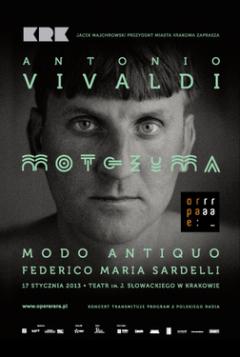Antonio Vivaldi – Motezuma (Sardelli) [2013]
Antonio Vivaldi – Motezuma (Sardelli) [2013]

1. Intro 2. Overture 3. Part I 4. Part I 5. Part I 6. Part I 7. Part I 8. Part I 9. Part I 10. Part I 11. Part I 12. Interview 13. Part II 14. Part II 15. Part II 16. Part II 17. Part II 18. Part II 19. Part II 20. Part II 21. Part II 23. Text 24. Bis 1 25. Text 26. Bis 2 27. Text Motezuma - Ugo Guagliardo Mitrena - Delphine Galou Asprano - Roberta Invernizzi Fernando - David Hansen Ramiro - Eugenia Burgoyne Teutile - Silvia Vajente Modo Antiquo Federico Maria Sardelli - director Juliusz Slowacki Theatre, Cracow, 17 January 2013
The fifth edition of the appreciated Opera Rara series was inaugurated by a performance of Motezuma by Antonio Vivaldi, which was presented by the famous Italian band Modo Antiquo conducted by charismatic Federico Maria Sardelli. The libretto took us to the times of the great conquest in the Kingdom of Aztecs – Tenochtitlan, where Motezuma, the last ruler of the Aztecs, tried to save his empire from the Spanish conquistadors.
The exotic American topic and the related story of the conquest of the Aztec Empire by Hernán Cortés was found interesting by Vivaldi to such an extent that he decided to compose an opera about the great tlatoani – Montezuma. None of the lost operas by the Red Priest have stirred as much interest in modern times as Motezuma has. If we add the circumstances of finding the score, which was kept in Kiev even after World War II, and the many years of struggle for copyrights to the performance of the opera, we come up with a ready script for a thriller. In Krakow, Federico Maria Sardelli decided to perform the opera in the form that was preserved in the manuscript found in 2000. As he wrote in the programme book: ‘I gave up the temptation to reconstruct the missing parts in order not to litter the world with new useless pasticcios’. Instead, he decided to refer to the listener’s imagination. By opting for authenticity, he withstood the current fashion for reconstructions.
Thus, out of the total number of 28 pieces, we only heard 17 of them that had survived, but we could be sure that the music we listened to was really written by Vivaldi’s own hand. The occasionally raw, but extremely fresh and interesting music was accompanied by the swift-paced plot. Conducting Modo Antiquo, Sardelli hypnotised the audience like a magician and an illusionist with his baton. As usual, the select group of soloists performed excellently, too. The title role belonged to the Italian bass Ugo Guagliardo – his task was to sing only two arias that had survived from the original opera (Se prescritta in questo giorno and Dov’e la figlia?), which he performed with extreme carefulness and charisma. In the part of Fernando (who fought the Aztec ruler) we heard Australian countertenor David Hansen. The Australian soloist stood out not only due to his glittering dark-gold jacket, but mainly due to the harsh timbre of his voice, which matched perfectly the arias sung by him (Sei troppo, troppo facile – You’re too gentle to be called a soldier). In other equally important roles we heard excellent female singers: soprano Roberta Invernizzi, a favourite singer of the Krakow audience (the Aztec general Asprano), Spanish mezzo-soprano Eugenia Burgoyne (Ramiro, Fernando’s brother), Italian soprano Silvia Vajente (Teutile, Motezuma’s daughter) and Delphine Galou, French singer who is very well known to the Krakow audience (Mitrena, Motezuma’s wife). Endowed with a rare contralto with a deep timbre, Galou particularly enchanted the audience with her impressive aria di bravura accompanied by horns – S’impugni la spada (Seize the sword, that the tyrant may see us). Recitatives, which were very long by Vivaldi’s standards, were performed in an excellent manner by Burgoyne and Hansen. The trio A battaglia, a battaglia t’aspetta sung by Motezuma, Fernando and Mitrena in the second act was also an innovation in Vivaldi’s times. The audience was particularly thrilled by the aria of rage D’ira e furor armato (Armed with anger and rage, an enemy of this kingdom boasts of his impious deeds), in which Invernizzi engaged in a frenzied dialogue with the trumpet. It is, therefore, not surprising that the arias performed by her and Galou were performed for an encore. Despite the complicated history of Motezuma, we could hear the work of the Red Priest for the first time in Krakow – moreover, we could hear it in the form which resembled the premiere Venice performance in 1733 to the closest possible extent. --- biurofestiwalowe.pl
Motezuma Antonia Vivaldiego to opera w trzech aktach. Utwór został oparty na libretcie Girolama Giusti’ego, a prapremiera miała miejsce w weneckim Teatro Sant’Angelo w 1733 roku. Bohaterami akcji są: Motezuma (bas-baryton), jego żona Mitrena (kontralt), jego córka Teutile (sopran), Fernardo – generał armii hiszpańskiej (kastrat), jego brat Ramiro (mezzosopran) oraz Asprano – generał meksykański (kastrat). Do 2002 roku partytura uważana była za zaginioną. Odnalazła się w archiwum Sing-Akademie zu Berlin zrabowanego i wywiezionego podczas II wojny światowej przez Armię Sowiecką. Współczesnego prawykonania koncertowego niekompletnej partytury dokonał w 2005 roku Federico Maria Sardelli, a premiera fonograficzna - dokonana przez Alana Curtisa - miała miejsce w 2006 roku, ze zrekonstruowanymi fragmentami przez Alessandra Ciccoliniego. --- operarara.pl
download: yandex 4shared mediafire solidfiles mega zalivalka filecloudio anonfiles oboom
Last Updated (Friday, 27 June 2014 10:47)








